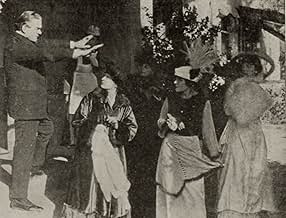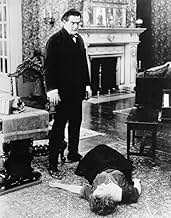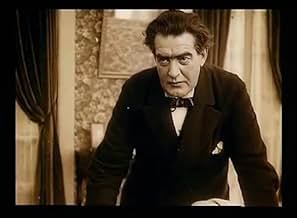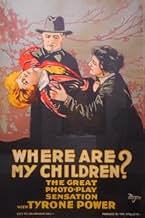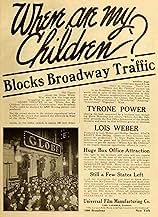A District Attorney's outspoken stand on abortion lands him in trouble with the local community.A District Attorney's outspoken stand on abortion lands him in trouble with the local community.A District Attorney's outspoken stand on abortion lands him in trouble with the local community.
- Awards
- 1 win total
Tyrone Power Sr.
- District Attorney Richard Walton
- (as Mr. Tyrone Power)
Mrs. Tyrone Power
- Mrs. Richard Walton
- (as Helen Riaume)
Alva D. Blake
- Roger - Mrs. Walton's Brother
- (as A.D. Blake)
George Berrell
- Judge
- (uncredited)
Georgia French
- Child
- (uncredited)
Mary MacLaren
- Walton's Maid
- (uncredited)
Andy MacLennan
- Man on Street
- (uncredited)
Anne Power
- Infant
- (uncredited)
Featured reviews
Quite apart from being one of the few chances to see a Tyrone Power film (father, not son); this Lois Weber film is a powerful anti-abortion piece - albeit one which is clogged with concerns around birth control and what looks to be misguided focus on the process of eugenics (i.e. determining strong genes and background before having children).
DA Richard Walton has always wanted children and cannot understand why his wife (played by the real-life Mrs Power, Helen Riaume) fails to conceive. Of course as we quickly find out, she has sent many unwanted children back to the portal of heaven where they wait to be called, by having numerous abortions and arranging for her friends to do the same, including the lazy social butterfly Mrs Carlo (Marie Walcamp).
There are three plot strands here - one concerning a progressive doctor (C Norman Hammond) who wishes to teach the poor about birth control and who is being prosecuted for obscenity; one concerning a virginal housemaid's daughter (Rena Rogers) who is seduced by Mr Walton's brother-in-law (William J Hope), with tragic consequences; and one about the trips to the abortion clinic of Dr Malfit (Juan de la Cruz) which are commonplace to Mrs Walton and her set.
Intercut with these stories are sights of the children waiting to be called into the womb - the unwanted as well as the wanted. This is perhaps the most artificial part of the film as the gates of heaven open and close to allow children to be called to earth or to return again to the portal of the unwanted. It works but looks rather old fashioned these days.
The ending is very moving, however, as Mr and Mrs Walton, knowing she is now unable to have children, are surrounded by the ghosts of their unborn as they descend into old age.
A preachy film but a powerful one. Amazing to think that items tackled here, over 90 years ago, could not be touched on again until the second half of the twentieth century.
DA Richard Walton has always wanted children and cannot understand why his wife (played by the real-life Mrs Power, Helen Riaume) fails to conceive. Of course as we quickly find out, she has sent many unwanted children back to the portal of heaven where they wait to be called, by having numerous abortions and arranging for her friends to do the same, including the lazy social butterfly Mrs Carlo (Marie Walcamp).
There are three plot strands here - one concerning a progressive doctor (C Norman Hammond) who wishes to teach the poor about birth control and who is being prosecuted for obscenity; one concerning a virginal housemaid's daughter (Rena Rogers) who is seduced by Mr Walton's brother-in-law (William J Hope), with tragic consequences; and one about the trips to the abortion clinic of Dr Malfit (Juan de la Cruz) which are commonplace to Mrs Walton and her set.
Intercut with these stories are sights of the children waiting to be called into the womb - the unwanted as well as the wanted. This is perhaps the most artificial part of the film as the gates of heaven open and close to allow children to be called to earth or to return again to the portal of the unwanted. It works but looks rather old fashioned these days.
The ending is very moving, however, as Mr and Mrs Walton, knowing she is now unable to have children, are surrounded by the ghosts of their unborn as they descend into old age.
A preachy film but a powerful one. Amazing to think that items tackled here, over 90 years ago, could not be touched on again until the second half of the twentieth century.
Although one may not agree with the sentiments of Where Are My Children?, nonetheless it is a powerful film dealing with a controversial subject, particularly for its day. Although Weber assumes a pedantic cloak in telling her story, she avoids sensationalizing it. One may disagree with her view of abortion as "perverting" woman's role in parenthood, but to me the focus of the film is the tragedy of Tyrone Power's character not having the children he so desperately wants.
The cast is quite good and from a historical perspective, note that this is the only known film of Helen Riaume, who plays Mrs. Walton. Also worth mentioning is the lovely Rena Rogers (Lillian), whose character serves as the fulcrum for the plot.
The last scene of the film is particularly moving, with Weber superimposing images of people into the picture, one of her favorite cinematic techniques. I highly recommend the film and look forward to viewing it again.
The cast is quite good and from a historical perspective, note that this is the only known film of Helen Riaume, who plays Mrs. Walton. Also worth mentioning is the lovely Rena Rogers (Lillian), whose character serves as the fulcrum for the plot.
The last scene of the film is particularly moving, with Weber superimposing images of people into the picture, one of her favorite cinematic techniques. I highly recommend the film and look forward to viewing it again.
This remarkable film has sometimes been described by historians as a movie about birth control, but it isn't, although birth control is presented as an alternative to abortion, which is the film's true subject. "Where Are My Children" is probably the most forthrightly anti-abortion movie ever made by a mainstream American studio, and how Lois Weber got away with it, I'll never know; a film like this couldn't possibly be made today.
I have no objections to a filmmaker using a movie as a vehicle for his or her convictions, as long as they're honest about it, and this movie is honest. Weber follows the logic of her plot, and her convictions, right to their end, without flinching from the logical and merciless conclusion. This is a gripping and powerful tragedy, well acted, written and directed. There is one unforgettable moment in which a quiet little gesture by Helen Riaume tells volumes; she has taken her friend to a doctor who performs abortions (and has done so for her), and while lingering in the waiting room, Helen yawns, as if terminating a pregnancy is a completely casual matter. It is a perfect, subtle sign about the depth of her corruption.
"Where Are My Children" isn't perfect; the scenes of souls in Heaven's antechamber, "waiting to be born," are a little heavy-handed, even if they give Weber the chance to use the trick photography she was so fond of. But the skill with which this movie is made is remarkable for 1916; this is a much more powerful movie than Griffith's "Intolerance," the most famous film of that year. I was amazed by "Where Are My Children," and I will never forget it.
I have no objections to a filmmaker using a movie as a vehicle for his or her convictions, as long as they're honest about it, and this movie is honest. Weber follows the logic of her plot, and her convictions, right to their end, without flinching from the logical and merciless conclusion. This is a gripping and powerful tragedy, well acted, written and directed. There is one unforgettable moment in which a quiet little gesture by Helen Riaume tells volumes; she has taken her friend to a doctor who performs abortions (and has done so for her), and while lingering in the waiting room, Helen yawns, as if terminating a pregnancy is a completely casual matter. It is a perfect, subtle sign about the depth of her corruption.
"Where Are My Children" isn't perfect; the scenes of souls in Heaven's antechamber, "waiting to be born," are a little heavy-handed, even if they give Weber the chance to use the trick photography she was so fond of. But the skill with which this movie is made is remarkable for 1916; this is a much more powerful movie than Griffith's "Intolerance," the most famous film of that year. I was amazed by "Where Are My Children," and I will never forget it.
This remarkable film provides a rare opportunity to see the celebrated British-born stage actor Tyrone Power (1869-1931), whose son - now far more famous than he - appears in the film as a toddler. The action takes place largely in and around the palatial home of district attorney Richard Walton (played by Power), which in the handsome tinted print currently available considerably helps sugar the pill of the unglamorous and sometimes harrowing detail of this extremely skilfully made film.
Only last week a British Tory MP caused red faces when comments he made five years ago proposing that the jobless have vasectomies became public knowledge; which shows that despite the Nazis' best effort to bring eugenics into disrepute, concern about Homo Sapiens' thinning gene pool continues unabated in the 21st Century, recently well expressed in the movie 'Idiocracy' (2006).
Initially the subject of 'Where Are My Children?' appears to be the advocation of contraceptive birth control as the means to end the misery inflicted upon impoverished women repeatedly bearing children they cannot afford to raise; but even here the implication is the rather heartless one that it would have been better had all the dishevelled and ill cared-for children we see never actually been born in the first place.
However, the focus then shifts to the affluent set, whose womenfolk are depicted as self-centred hedonists shirking their responsibility to future generations by not reproducing; an opinion you'll still hear being expressed today. These women seem to have maintained their state of pristine childlessness through regular abortions - like visits to the dentist - rather than the use of contraception.
Was this really the case a hundred years ago?
Only last week a British Tory MP caused red faces when comments he made five years ago proposing that the jobless have vasectomies became public knowledge; which shows that despite the Nazis' best effort to bring eugenics into disrepute, concern about Homo Sapiens' thinning gene pool continues unabated in the 21st Century, recently well expressed in the movie 'Idiocracy' (2006).
Initially the subject of 'Where Are My Children?' appears to be the advocation of contraceptive birth control as the means to end the misery inflicted upon impoverished women repeatedly bearing children they cannot afford to raise; but even here the implication is the rather heartless one that it would have been better had all the dishevelled and ill cared-for children we see never actually been born in the first place.
However, the focus then shifts to the affluent set, whose womenfolk are depicted as self-centred hedonists shirking their responsibility to future generations by not reproducing; an opinion you'll still hear being expressed today. These women seem to have maintained their state of pristine childlessness through regular abortions - like visits to the dentist - rather than the use of contraception.
Was this really the case a hundred years ago?
I find it interesting that Mrs. Walton is credited as Helen Riaume (with no IMDb link). This appears to have been the same Helen Riaume who is credited elsewhere as "Mrs. Tyrone Power," and was Tyrone Power Sr.'s wife until the same year this was released. The content of this film is unusual enough, and having a married couple playing the leads and not credited as such adds to the interest.
In particular, the content was of a controversial nature in 1916, and is even more so today, with the sides reversed. The topic of abortion (called simply "birth control" in this movie) was not one that was raised often in films anyway, and moral guardians would have hesitated to let a movie through that favored the practice. The climate of Hollywood being what it is today, there might be no legal impediment to making a similarly anti-abortion film, but it would certainly be frowned upon, and perhaps de facto blacklisted.
In particular, the content was of a controversial nature in 1916, and is even more so today, with the sides reversed. The topic of abortion (called simply "birth control" in this movie) was not one that was raised often in films anyway, and moral guardians would have hesitated to let a movie through that favored the practice. The climate of Hollywood being what it is today, there might be no legal impediment to making a similarly anti-abortion film, but it would certainly be frowned upon, and perhaps de facto blacklisted.
Did you know
- TriviaThe two children of Tyrone Power Sr. and his co-star and real-life wife Helen Reaume (aka, Mrs. Tyrone Power), appear in this film: their newborn daughter Anne Power and their two-year-old son Tyrone Power, who became a matinee idol from the 1930s to the 1950s. He appears in the last minute and a half of the movie as a "ghost child".
- Quotes
Opening Title Card I: The question of birth control is now being generally discussed. All intelligent people know that birth control is a subject of serious public interest. Newspapers, magazines and books have treated different phases of this question. Can a subject thus dealt with on the printed page be denied careful dramatization on the motion picture screen? The Universal Film Mfg. Company believes not.
- Alternate versionsIn 2000, the Library of Congress Motion Picture Conservation Center copyrighted a preservation print reconstructed from several incomplete prints. Funded by the Women's Film Preservation Fund of New York Women in Film and Television, it was coordinated by Scott Simmon, has a piano score composed and performed by Martin Marks, and runs 62 minutes.
- ConnectionsEdited into Governing Body (2023)
Details
- Release date
- Country of origin
- Languages
- Also known as
- The Illborn
- Filming locations
- Production companies
- See more company credits at IMDbPro
- Runtime1 hour 2 minutes
- Sound mix
- Aspect ratio
- 1.33 : 1
Contribute to this page
Suggest an edit or add missing content

Top Gap
By what name was Where Are My Children? (1916) officially released in Canada in English?
Answer
